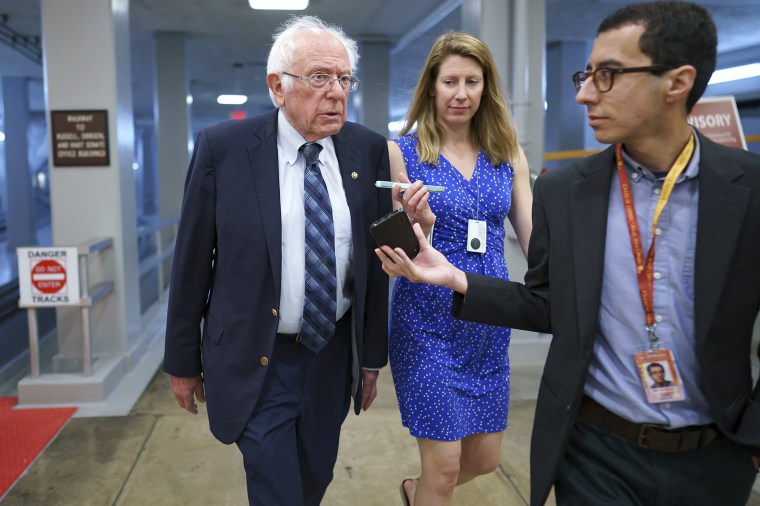WASHINGTON — Progressives want to get to work on a massive $6 trillion economic package. Moderate Democrats say that's too pricey.
From price tag to policy details, Democratic leaders are confronting early internal divisions over how to write a budget measure that can bypass a Republican filibuster in the Senate. They would need to unify their wafer-thin majorities in both the House and the Senate.
The price tag is an early point of contention. Senate Budget Committee Chair Bernie Sanders, I-Vt., said Thursday that the committee is considering a $6 trillion spending figure. Sen. Jon Tester, D-Mont., said on MSNBC that it "seems a bit hefty to me." And Sen. Joe Manchin, D-W.Va., said it's "extremely large."
That would far exceed President Joe Biden's request of $4 trillion for his two economic packages.
"The president has given us a framework. I think it is a comprehensive and serious framework. It is the function of the Congress now to take that framework and go with it," Sanders said.
"Everything is in movement. This is a proposal," he said. "It's going to change every day."
House and Senate Democrats are targeting July to settle their disputes and pass a budget resolution, which would instruct the committee to write legislation that could evade a Senate filibuster. There's no realistic chance that Democrats will finish the bill before the monthlong August recess. But they want to begin the process before the break.
"We're just starting to meet now with committee chairs and the caucuses to get their input and putting it together," House Budget Committee Chair John Yarmuth, D-Ky., said in an interview. "I just don't see how there's enough time to do it before the middle of July."
Yarmuth didn't commit to $4 trillion or any other dollar figure.
"It won't be small," he said. "There are a lot of people trying to get other things in there."
There are likely to be policy divisions over aggressive demands by the Congressional Progressive Caucus, which include capping drug prices and funding new housing upgrades consistent with the Green New Deal.
Other progressive goals, such as a path to citizenship for front-line pandemic workers and young, undocumented "Dreamers," may not comply with rules that limit the process to spending and taxes.
A group of five House Democrats is demanding debt stabilization measures, which the left rejects.
The party will have to agree on which taxes to raise — and opinions differ sharply between the liberal and moderate factions. Separately, regional demands by a group of New York and New Jersey Democrats to lift the $10,000 "SALT" limit on state and local tax deductions face an uncertain path.
That's not all: Democrats are still torn over whether to continue to pursue a bipartisan infrastructure deal with Republicans in addition to a separate party-line package or whether to do it all in one bill.
Rep. Pramila Jayapal, D-Wash., the progressive caucus chair, said that in some cases the budget resolution need not be explicit about policy and that in some cases it's "very important" to get specific.
"On child care, the universal benefit will be about a number — all the detail of it doesn't need to be in there. But for Medicare expansion, we will have to probably be a little bit more specific about what's in the budget resolution," she said. "So this will be a very important moment for progressives."
In the meantime, Biden will have to decide whether to embrace or reject the bipartisan $579 billion infrastructure framework backed by 11 Republicans, who haven't released key details.
"We are anticipating, at some point, getting a reconciliation bill," said Senate Minority Leader Mitch McConnell, R-Ky. "What we will find out soon is whether there's an additional bipartisan effort."
The answer could shape whether Democrats include infrastructure targets in the budget resolution.
"We've come together on the parameters," said Sen. Mitt Romney, R-Utah. "And then the question is: Will there be acceptance by the White House on the proposal we made?"
The White House is seeking to balance demands by some Democrats to pursue compromise with an insistence by others that a bipartisan deal not jeopardize a bigger Democrats-only package, which would be likely to include increases in taxes on corporations and upper earners.
"If you have an interest in doing some of these more progressive pay-fors, then the vehicle for that is reconciliation, rather than trying to negotiate with 10 Republicans on finding revenue," said Sen. Brian Schatz, D-Hawaii. "I think that's a fool's errand."
Tester said he's open to a GOP deal and a reconciliation bill.
"We have to see what's in it to make sure that it's money that, No. 1, is well spent and helps move our economy forward," he said. "Our chief economic threat in this world is China, and we have got to make sure we can out-compete them. And infrastructure is a big part of that."

